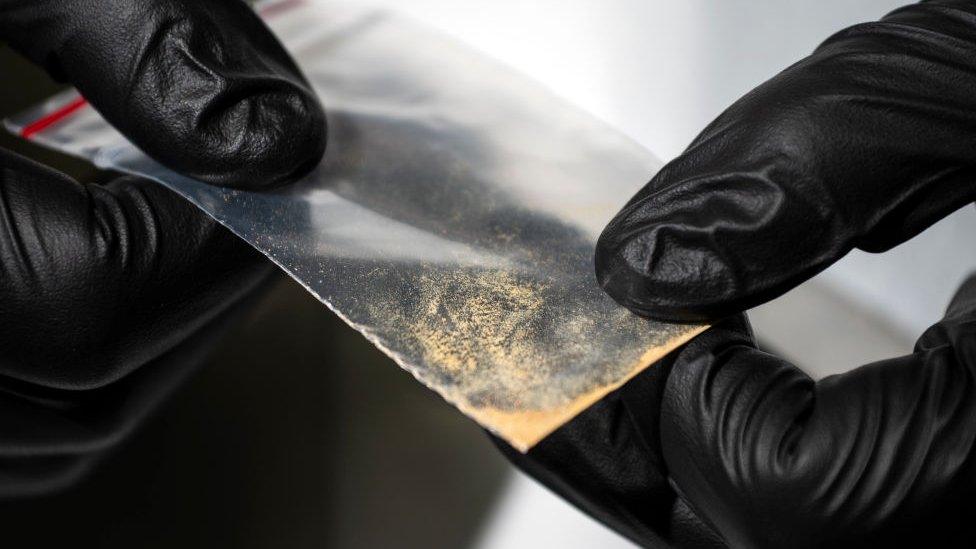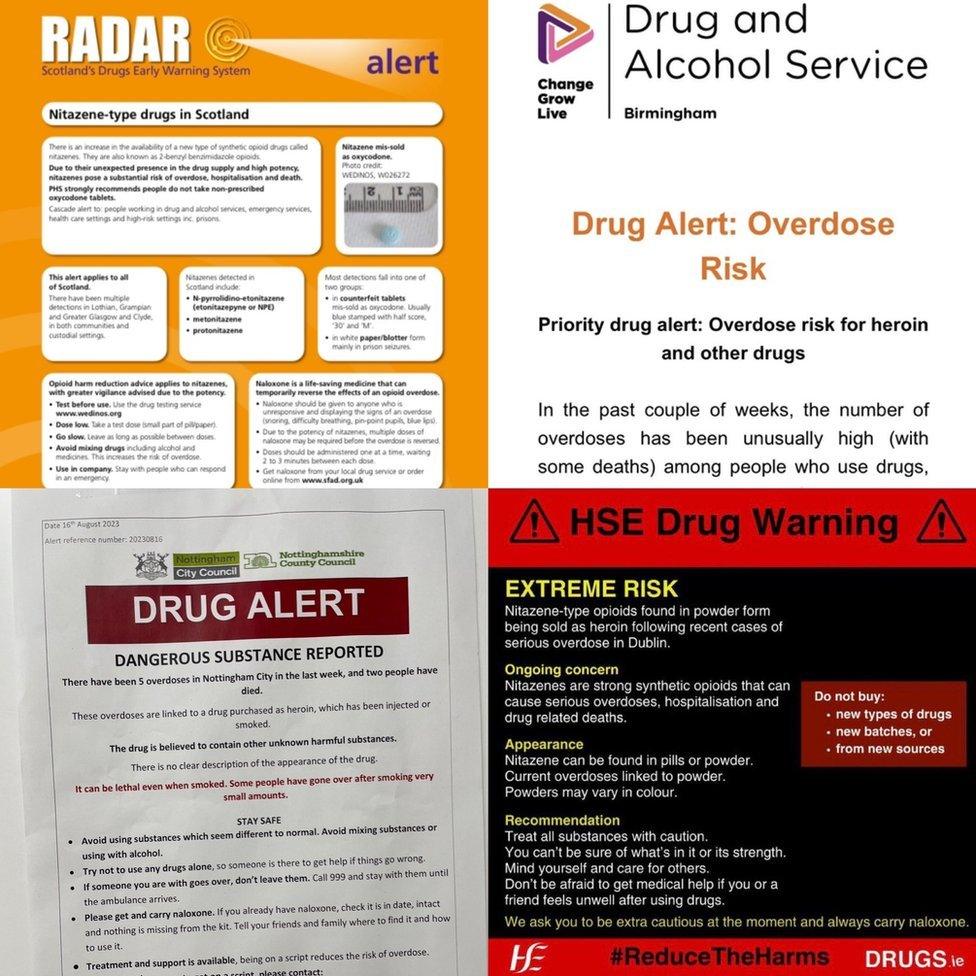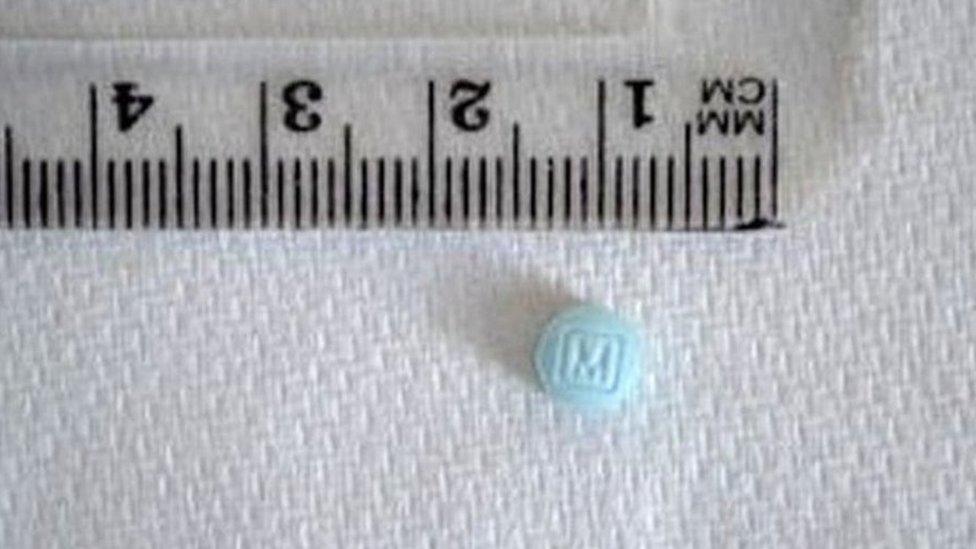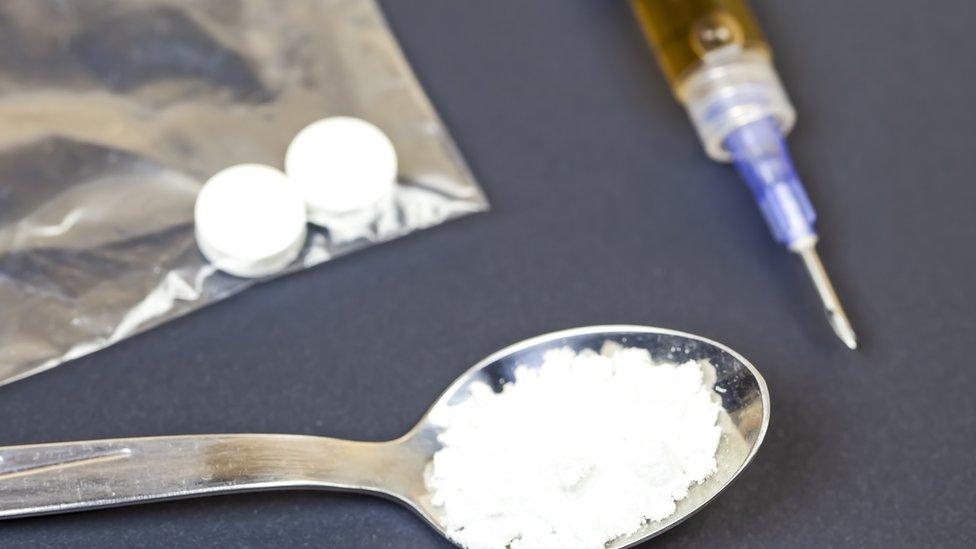Nitazenes: Teesside addict speaks as street drugs spiked
- Published

Nitazenes are contaminating drug supplies in Teesside
Super-strength synthetic opiates - linked to dozens of recent deaths - are many times more potent than the hardest street drugs.
Authorities are warning drug users to "be prepared" for the potentially fatal impact of nitazenes as addicts - and those who help them - say this drug scare is the most frightening they've experienced.
More deadly than heroin and fentanyl, nitazenes have been linked to at least 54 UK deaths in the past six months.
And now they are circulating in the North East, according to a drugs alert.
New statistics, external show the region has had the highest drug-death rate in the country for a decade.
The stark and deadly consequences of opiate use are nothing new for the area but nitazenes hit differently and their presence on the streets of Teesside is striking fear into even the most hardened drug addicts.
'They're killing people'
Robert (not his real name) has used Class A substances for decades. He takes crack cocaine every day, used heroin for years and is no stranger to most street drugs.
Earlier this month, 53-year-old Robert, from Teesside, took his usual cocktail of tablets and saw events take a very different turn than he was accustomed to.
Waking up in hospital, he learned he'd nearly died from an overdose - and he's convinced nitazenes were to blame.
"Over the last few months, the tablets round here have been different," he says.
"They're putting new drugs in them, people aren't aware of what they're taking and the nitazenes are even worse than fentanyl.
"They're killing people and it's frightening. I nearly lost my life.
"It's just about money for those doing it. It won't stop."

What are Nitazenes?
Nitazenes were first developed in the 1950s as a pain-killing medication but are so potent and addictive they have never been approved for medical or therapeutic use
Injected, inhaled or swallowed, mixing them with other drugs and alcohol is extremely dangerous and significantly increases the risk of overdose and death
The new drugs are covered by the Psychoactive Substances Act 2016, external

The drug alert issued in Teesside this month is the latest in a series issued across the country as synthetic opiates become more prevalent across the UK.

Nitazene warnings have been issued across the UK
A spokesman for the Tees Preventing Drug and Alcohol-related Deaths Group said it had been alerted to the presence of nitazenes locally and is working to support those at risk and "investigate and understand" the extent of the issue across the Tees Valley.
The alert, raised by the organisation on 12 December, suggests giving one shot of the drug naloxone - a common and often successful way of reversing opiate overdoses - may not be sufficient for those who have taken nitazenes.

The alert provides advice to drug users, including:
Be cautious about what you are taking
Dose low and go slow - take a test dose and leave as long as possible between doses
Avoid mixing drugs including alcohol and medicines
Use in company and stay with people who can respond in an emergency
Look after friends and take turns to watch for the signs of an overdose
Be prepared to give more than one dose of naloxone to reverse overdoses
Use a drug testing service

'Really concerned'
Niamh Eastwood, executive director of drugs charity Release, says the contamination of street drugs with nitazenes is country-wide and linked to a growing number of overdoses.
Ms Eastwood believes the true scale of the nitazene problem in the UK is impossible to estimate due to variability between local authority approaches to monitoring drug poisoning and trends.
But the impact is already such that she describes herself as "really concerned" about supply contamination in the UK for the first time in her decades-long career.
Highly alert
A Home Office spokesperson said the government is "highly alert" to the threat from synthetic drugs and had established a taskforce to tackle the risk from synthetic opioids to the UK.
In February, 11 synthetic opioids , externalincluding 10 nitazenes were banned, with policing minister Chris Philp then saying the drugs were 'ruining lives and devastating communities'.
Following a sudden spike in UK deaths this summer, the government issued a warning, external and last month announced plans to classify another 15 synthetic opioids as illegal Class A substances, external.
ONS data, external published this week shows 332 drug poisoning deaths were registered in the North East in 2022 - and more than nine in 10 of them were linked to opioid use.
The region had the highest rate of drugs deaths in 2022, for the 10th consecutive year.

Follow BBC North East on Facebook, external, X (formerly Twitter), , externaland Instagram, external. Send your story ideas to northeastandcumbria@bbc.co.uk, external.
- Published11 December 2023

- Published15 December 2023

- Published8 October 2023
